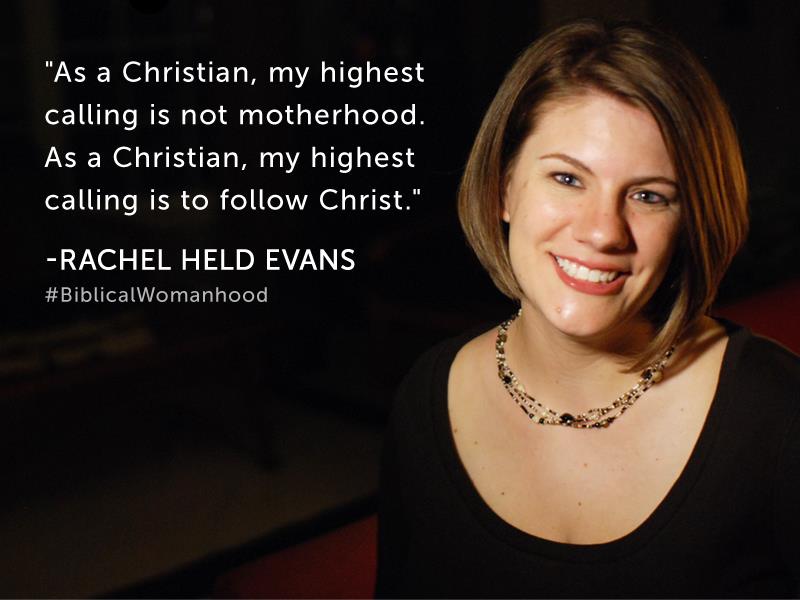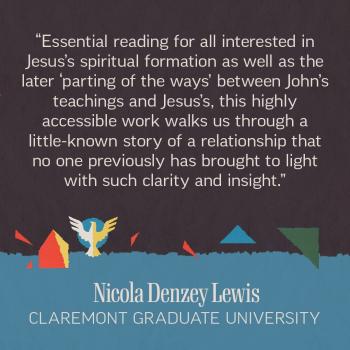I’m grateful to Rachel Held Evans for having sent me an advance review copy of her book, A Year of Biblical Womanhood: How a Liberated Woman Found Herself Sitting on Her Roof, Covering Her Head, and Calling Her Husband “Master”. I confess I am a bit embarrassed that I’m only blogging about it after the book is already out. But since her book had no shortage of attention in the run up to its release, perhaps I can make up for it with a well-timed mention in the heart of the Christmas shopping season.
This book will make an Christmas present, whether for yourself or for someone else. It deals with a serious topic in a beautiful, honest, and entertaining way. It is full of humor from the very first page, and I am confident that there will be moments when you will literally laugh out loud. The book is rich in detail, not only about Rachel’s year of seeking to live “biblically” but also about other aspects of her life and upbringing.
Back when she was still writing it, there were people who asked Rachel whether the book she was writing had not already been written – by A. J. Jacobs in his The Year of Living Biblically. That question actually gets nicely at the heart of what the book is about, and why it is such an important one. The Bible views and treats women differently than men, and those religious traditions which look to the Bible for guidance, or for authoritative answers to questions, have been known to continue that differentiation. And so Jacobs never had to isolate himself during his menstruation, or call his spouse “master.” Rachel’s book is different than Jacobs’ – although if you enjoyed Jacobs’ book then I am confident that you will enjoy this one too. Its treatment of this topic is desperately needed in a world in which the Bible continues to be appealed to in order to justify denigration of and discrimination against women.
 As a New Testament scholar, it is a pitfall of the trade to have a low tolerance for even the slightest mishandling of those texts that I study and teach about for a living. And so I am truly impressed to say that I found Rachel’s book to be theologically profound and exegetically insightful in places. There were places where it would have been useful to say more – such as acknowledging that the context she describes as the background for 1 Timothy, while plausible, is hypothetical (pp.260-261). For her audience and aims, I didn’t have a problem with setting to one side the issue of authorship of that work, although that topic is not irrelevant to the subject of “Biblical womanhood.” But, be that as it may, if I occasionally had quibbles or the instinctive scholar’s desire for more precise nuance, I didn’t have any strong objections, places where I felt that Rachel’s treatment of the Bible was wide of the mark. Overall, she did a good job of taking into account what scholars have to say about the Bible. And that’s an important point to mention, since she does in places turn her attention directly to organizations and institutions that do misuse or selectively cite the Bible in order to justify things like the prohibition of women from having leadership roles (see pp.253-254; see also her excellent treatment of the misuse of Paul’s teaching about sexual asceticism and mutuality in 1 Corinthians, and how some have twisted this in a command aimed at women demanding that they provide sexual services to their husbands whenever he should desire them, on pp.99-109).
As a New Testament scholar, it is a pitfall of the trade to have a low tolerance for even the slightest mishandling of those texts that I study and teach about for a living. And so I am truly impressed to say that I found Rachel’s book to be theologically profound and exegetically insightful in places. There were places where it would have been useful to say more – such as acknowledging that the context she describes as the background for 1 Timothy, while plausible, is hypothetical (pp.260-261). For her audience and aims, I didn’t have a problem with setting to one side the issue of authorship of that work, although that topic is not irrelevant to the subject of “Biblical womanhood.” But, be that as it may, if I occasionally had quibbles or the instinctive scholar’s desire for more precise nuance, I didn’t have any strong objections, places where I felt that Rachel’s treatment of the Bible was wide of the mark. Overall, she did a good job of taking into account what scholars have to say about the Bible. And that’s an important point to mention, since she does in places turn her attention directly to organizations and institutions that do misuse or selectively cite the Bible in order to justify things like the prohibition of women from having leadership roles (see pp.253-254; see also her excellent treatment of the misuse of Paul’s teaching about sexual asceticism and mutuality in 1 Corinthians, and how some have twisted this in a command aimed at women demanding that they provide sexual services to their husbands whenever he should desire them, on pp.99-109).
 The book is wonderfully quotable, and I feel like I need to have a series of “Quote of the Day” excerpts rather than merely stuffing many of them into this blog post. But to not give them here would do the review and Rache;s book a disservice, and so I will include a small sampling.
The book is wonderfully quotable, and I feel like I need to have a series of “Quote of the Day” excerpts rather than merely stuffing many of them into this blog post. But to not give them here would do the review and Rache;s book a disservice, and so I will include a small sampling.
After offering an insightful statement about those who claim that the Bible never troubles them (p.51), she writes, “Those who decry the evils of selective literalism tend to be rather clumsy at spotting it in themselves” (p.52). And about the ignoring of context she writes, “we dishonor the original intent and purpose of the Epistles when we assume they were written in a vacuum for the purpose of filling our calendars and bumper stickers” (p.259).
Speaking about the “P31 girl” (i.e. Proverbs 31), Rachel writes, “She’s like the evangelical’s Mary – venerated, idealized, glorified to the level of demigoddess, and yet expected to show up in every man’s kitchen at dinnertime. Only unlike Mary, there is no indication that the Proverbs 31 woman actually existed” (p.74).
I could go on providing quotes illustrating Rachel’s knack for getting at the heart of an issue in a short, memorable statement, or her ability to treat the Bible and her year-long project with reverence and seriousness and still leave you doubled over laughing. This book will inspire and entertain you, and if you have not figured it out by now, let me say it explicitly: I highly recommend it. I think it will be a great book for couples to read together. I think it is a great book for Christian women to read – and one that many Christian men need to read. It is a great book for people to read who want or need to understand the diversity of contemporary Christianity, and to grasp not only that there is more to this faith tradition than restrictions imposed on women, but that even those born into conservative forms of Christianity are finding themselves asking important questions, and finding answers other than those they had handed to them or imposed upon them earlier in their lives. It is a great book to read if you are even remotely interested in the topic of what Christians (and others!) do with the Bible in our contemporary context.
There are quite a number of take-away points towards the end of the book, including things that Rachel says she will take with her even after her “year of Biblical womanhood” is over. But I think the best way to conclude this review is to let Rachel have the last word, in her own words (pp.293-295):
The fact of the matter is, when we turn the Bible into an adjective and stick it in front of another loaded word (like manhood, womanhood, politics, economics, marriage, and even equality), we tend to ignore or downplay the parts of the Bible that don’t fit our tastes. In an attempt to simplify, we try to force the Bible’s cacophony of voices into a single tone, to turn a complicated an at times troubling holy text into a list of bullet points we can put in a manifesto or creed. More often than not, we end up more committed to what we want the Bible to say than what it actually says.
So after twelve months of “biblical womanhood,” I’d arrived at the rather unconventional conclusion that there is no such thing. The Bible does not present us with a single model of biblical womanhood, and the notion that it contains a sort of one-size-fits-all formula for how to be a woman of faith is a myth…As much as we may long for the simplicity of a single definition of “biblical womanhood,” there is no one right way to be a woman, no mold into which we must cram ourselves…
…For those who count the Bible as sacred, the question when interpreting and applying the Bible to our lives is not, will we pick and choose? but rather how will we pick and choose? We are all selective in our reading of Scripture, and so the question we have to ask ourselves is this: Are we reading with the prejudice of love or are we reading with the prejudices of judgment and power, self-interest and greed?

















